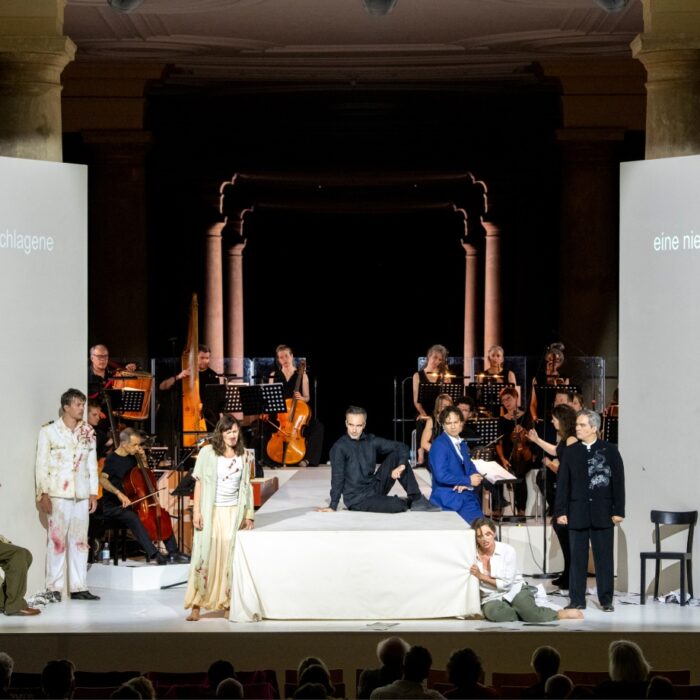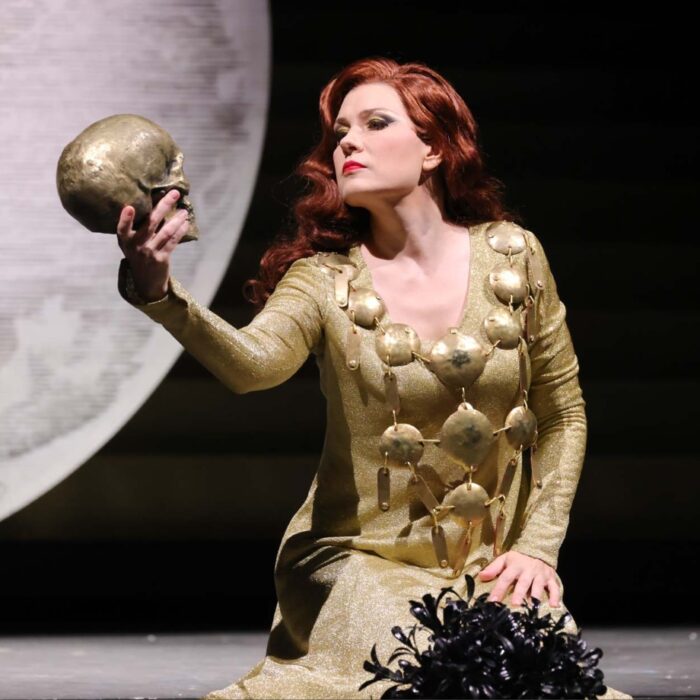
Wigmore Hall 2017-18 Season Review – Joyce DiDonato is a Lyrical Sorceress
By Sophia LambtonThere is an old ubiquitous adage – alternately attributed to Goethe, Sibelius or Wagner – that summarily affirms music begins where words end. If that were the case, such an assertion would defy the very need to write reviews about performance. And Joyce DiDonato leaves reviewers stymied.
In a repertoire so far astray from her typical programmes – whether they be Baroque-centred, bel canto-ridden or infused with smoky Gershwin standards – DiDonato canvassed a collective of idyllic songs spanning the late impressionistic era to the current day in a recital with the Brentano String Quartet at Wigmore Hall. They were not only mystical and ominous – but otherworldly. It was a paradigm of DiDonato’s vocal effervescence hitherto unheard.
As a verse recitalist, she began with a lacquered application of onomatopoeia. Interpreting different poems from Richard Strauss’s five songs “Schlichte Weisen,” DiDonato was not content as many others might to bookend her phrases with mellifluous crescendi and diminuendi that emphasize peaks of first joy then dismality. Hers was an approach that appropriated extremely particular effects to the words she selected – whether they were accents at the beginning of phrases, languishing melismas, brusque and stark cut-off notes or a fading conclusion. Singing “Du meines Herzes Krönelein”, “stille (quiet)” was rounded off with a slow-burning intensity to effuse the word’s meaning through its vocalization.
Where most singers must rein in vibrato to avoid lines that fester with unrestrained quivering, DiDonato employed hers with a string player’s range of options: her singing could be void of the technique completely in one phrase and then drenched in its varnishing embellishment throughout the other. And nothing whatsoever could be arbitrary in these choices; they were each of them effectuated in an idiosyncratic style, in perfect taste, derived from an unflappable intelligence. In “Die Nacht,” the third song of “Schlichte Weisen,” DiDonato layered a thick and incremental vibrato and crescendo to “lichter” in “Alle Lichter dieser Welt (All lights of this world).” Two stanzas later as her song ordered the poet’s lover to “come closer (Rücke näher),” she applied a much steadier and shier increase of vibrato to the second word to emphasize a lover’s tension as he fears the “night will steal [you] too from me.”
DiDonato’s artistic choices didn’t just span words – for they were palpable throughout her syllables. In “Traum durch die Dämmerung (Dream into dusk),” her character saw sunset as a signal to go see his love. We heard a tiny crescendo on the second syllable of “verglomm (the ‘set’ of ‘sunset’),” which transported to us his fevering anticipation. Referring to the “land of love,” she offered us the end note of “Land” with a stretched-out Wagnerian fervor; a zeal that resembled Isolde’s.
When the time came for the accompanying Brentano String Quartet to play alone, it felt like an unwarranted intrusion. Playing Lekeu’s “Molto adagio sempre cantante doloroso,” Mark Steinberg domineered the music with a plaintive first violin and languishing, lamenting stretched-out notes. The cello at the hands of Nina Lee was played with rhythmic perfection but could have yielded to a more melodious “cantabile” nature; Misha Amory’s viola offered occasional darkened, portentous, diminuendi. Altogether while the quartet’s synchronicity was for the most part tight, one felt these talented musicians were performing individually at the same time rather than fusing to create confluence as a single entity.
DiDonato returned to our ears with Debussy’s “Chansons de Bilitis:” a transfixing trio of erotic songs. While the words themselves offer no expositions of misery or blatant outcries, behind them lurks a teeming melancholy the narrator can’t resist. DiDonato unpicked all these moments – adding a separate dimension of sadness as she sang of the lovers’ mouths finding each other over a flute. Her handling of that one word, “flûte” as two individual, contrasting notes ensured it bore a double meaning: the first being the memory’s excitement and the second, in her stark diminuendo, the ensuing pain.
The pulsating vibrato of “toi-même” in the second song, “La chevelure,” when her character refers to the sensation of conjoining with her lover, demonstrated not just boiling fervor but her personage’s fear before the onslaught of her feelings. Where the end of the song speaks of the aftermath of a tryst, DiDonato embalmed her character into a paralytic, still hypnosis. Singing “Quand il eut achevé (When he finished),” she offered notes that were deliberately still and deprived of vibrato; wondrous and impossibly entrenched in their thoughts. The sound was a clean, smooth, metallic one; an echoing triangle in DiDonato’s multi-sectional orchestra of vocal expression.
The mezzo-soprano’s performance of Jake Heggie’s 2012 work, “Camille Claudel: Into the Fire” was not just a glossary of varying sentiments. but the embodiment of both Claudel and her encroaching claustrophobic ambiance. Camille Claudel was an unfortunate French sculptress who died without any recognition of her work. DiDonato imbued her interpretation of the artist with unshakeable contemplativeness; a diminuendo on the word “naked,” whose origin felt as authentic as the gradual cessation of rain patter over a rooftop. Most of the time there’s simply nothing that’s effectuated about DiDonato’s singing; it is as natural as the coming of the tide or a thaw melting in a rising winter temperature.
Her second cry of “Rodin” in the first song of the same name was a vibrato-filled, lengthy crescendo whose conclusion one could not foresee. Singing of his “eyes”, “brow” and “hair,” she split the tricolon into three separate entities carrying their own meaning – twisting each new word differently to its antecedent. Throughout “La Valse” her voice swung like a hammock in the summer; rocking easily with every rise and fall. DiDonato’s decisions about where to insert caesura in the verse – those abrupt silences – echoed her character’s realizations; she paused twice in just the three words “mingled with regret.” She made the one word “flesh” appear to be three different instruments by stretching it over three notes.
In the fourth song, “La petite Châtelaine,” DiDonato offered a melisma of some nine notes on the ‘fi’ of “fire;” each one of them of different lengths and attitudes. “Gossips” allowed her the kind of gradual crescendi that rose like an echo spreading little by little across the Grand Canyon. And certain trills could begin very slowly, allowing listeners to hear two alternating notes – and then accelerate to such a pace that they grew indistinct amidst a spinning bolt of lightning.
For most of the evening DiDonato abided in a parallel universe; intoxicated by a spell. And so were we.
While it’s a grand statement, it nevertheless bears repeating: since the explosion of her career back in 2009 (and some would argue earlier than that) – Joyce DiDonato has been by far the most stupendous vocal artist on the opera scene. That instrument of hers is difficult to take for granted. It’s an uncanny body of surprising switches gifted with a seamless flexibility. One thinks of those immediately recognizable, sensual, harsh notes; those strange elastic stretches that attenuate a sound across an elongated period; that blackening, menacing pit at the lower end of her register.
When such distinct manipulations are made of an already irreplaceable voice, it is a fusion that creates consummate art. The awe of the unprecedented hybrid is a double one. One listens not in lulling comfort – but awaiting her imminent shifts, her new molding of notes, her always juicy, always personal twists.
The evening finished off with an encore of Strauss’s “Morgen!” – an almost-cliché of a song that DiDonato easily converted to a mystical, reflective bout of thought.
Most critics would advise young singers learn from her. The truth is that many long gone and more renowned ones could have as well.


